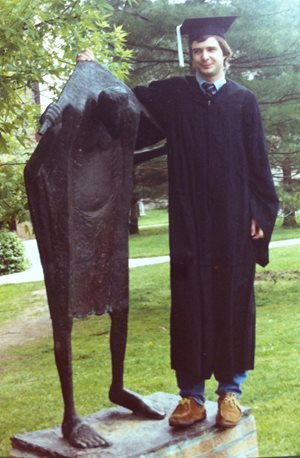Twelfth Sunday in Ordinary Time
First Reading: Jeremiah 20:10-13
Responsorial Psalm: Psalm 69:8-10, 14, 17, 33-35
Second Reading: St. Paul’s Letter to the Romans 5:12-15
Gospel: According to St. Matthew 10:26-33
One of the iconic images from my days as an undergraduate was Waldemar Otto’s statue of the prophet Jeremiah that stood directly outside the front door of Grace Hall, my home under the Dome. I felt a kinship with the man depicted in this bronze tribute as I trudged back to my dorm after classes, fighting against the early darkness and bitterly cold wind and snow of the unforgiving northern Indiana winters, imagining my backpack as a yoke, and thinking of Bl. Cardinal Newman’s assessment of Jeremiah as a man of “good hope, work and disappointment.”

When graduation day came it was great to take photos with various relatives, but my one true wish was to get a shot of myself with the man who stood as a solitary witness to the “good hope, work and disappointment” that defined my days at ND, a friend who was always there to greet me in good times and in bad. As I look back on that picture today I have to laugh at my fashion statement – the traditional shirt and tie, but with jeans and Wallabees (conservative hippy?). And then there’s the ever-present smirk of a young man with too much education and not enough life experience.
At the time I did not catch the irony of my pose in relation to the yoke-burdened prophet, but today, as I look again at this weekend’s offering from Jeremiah I realize that had that bronze been able to speak it would have told me that life would do its best to wipe that smirk off my face. The school of real life, where there is no summer vacation or Christmas break, affords us the mix of easy and difficult instructors, as well as fun projects and killer final exams.
Jeremiah knew all of this first hand as a man called by God: “before I formed you in the womb I knew you, before you were born I dedicated you, a prophet to the nations I appointed you” were God’s exact words. Jeremiah didn’t want to be a prophet – “I do not know how to speak. I am too young!” But God was having none of it. So not only did Jeremiah live during the darkest days of the Kingdom of Judah when the city of Jerusalem was invaded and the Temple was destroyed, but he also had the task of delivering the bad news to the king and nation that they were about to be overrun by the Babylonian Empire of Nebuchadnezzar.
When Jeremiah tells God that he is unhappy at being persecuted for preaching ruin and destruction God’s response is basically ‘get used to it because it is going to get worse.’ So Jeremiah decides that he is going to keep his mouth shut in order to stay alive, and it is here that this weekend’s reading picks up the story. In the verse just prior, Jeremiah bemoans the fact that he tried to stay quiet, but: “I say I will not mention Him, I will no longer speak in His name. But then it is as if fire is burning in my heart, imprisoned in my bones; I grow weary holding back, I cannot!” So against his better judgment he feels compelled to continue to be God’s prophetic voice.
At this point he cries out: “the Lord is with me, like a mighty champion: my persecutors will stumble, they will not triumph.” As a reward for his faithfulness under duress, God tells him to carry around a yoke to symbolize the slavery that the people will receive at the hands of the Babylonians. Our Catholic sense of biblical symbolism can’t help but draw us to see the yoke as the Cross of Christ, a Cross that Jeremiah bears with patience and humility as he is mocked by the false prophet Hananiah.
In this weekend’s Gospel reading form St. Matthew, Jesus tells His followers “Do not be afraid…Everyone who acknowledges me before others I will acknowledge before my heavenly Father. But whoever denies me before others, I will deny before my heavenly Father.” Few in the history of salvation have more reason to rejoice at these words than Jeremiah. Ultimately, the school of real life taught Jeremiah many important lessons, but none as important as that of the good hope that comes from staying true to one’s work despite great disappointments. And that is nothing to smirk at.
A.M.D.G.